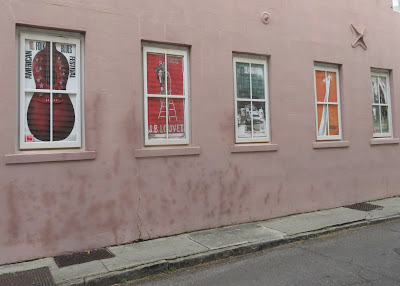In case you missed it, I've been taking a photography course in the senior division at our local university. The course culminates in presenting a photographic portfolio to the class, centered on a particular theme. One man did covered bridges. Everyone agreed his photos were the best. One woman focused on pictures of picture frames. They were kind of abstract, and everyone thought her photos were the most original.
Since I was in Charleston, SC, at the beginning of the class, I picked "Historic Charleston" as my theme. I got "most improved," which means . . . well, we all know what "most improved" means.
Anyway, the instructor asked us to write a brief introductory essay to set up the photos:
Historic Charleston, SC
for CLR: 505 Planning and Creating
a Photographic Project
Charleston, SC, one of the oldest
cities in America, was founded in 1670 and named after King Charles of England.
It was a significant port in early America for trading in rice, cotton . . . and slaves.
Charleston was home to Francis Marion, the heroic Revolutionary War
general known as The Swamp Fox, as well as John C. Calhoun, U. S. Senator, Vice
President of the United States, and staunch supporter of slavery.
The Civil War
started in Charleston on April 12, 1861, when Confederates bombarded the
federal installation at Fort Sumter. The city suffered significant damage
during the war, but was spared complete destruction when Union General William
Tecumseh Sherman marched to the west and continued up to North Carolina at the
end of the war.
Today, Charleston is one of the
fastest growing cities in the country, attracting college kids, retirees and everyone in between. The Citadel, a military college, has been famously featured in the
novels of Pat Conroy, and the College of Charleston has grown from less than 1,000 students
in the 1970s to over 10,000 undergraduate and graduate students today.
Here are a few photos focusing on
historic Charleston:
1.
The Battery faces Charleston Harbor, with its historic homes.
2.
Cumberland St. is located in the historic district where street names are
embedded in sidewalks on the street corners.
3.
Art student paints a building on the College of Charleston campus.
4. Private garden is typical of the old stately
homes south of Broad, a main east/west thoroughfare.
5. Graveyard stone is located at St. Philip’s church,
where John Rutledge and Charles Pinckney, two signers of the U. S.
Constitution, are buried. This stone reads:
Margaret Charlotte Elford
Wife of James Maud Elford
Who departed this life 9 May 1817
Aged 43 years 4 months and 20 days
Leaving a husband with seven young
children to lament their irreparable loss
She was
In childhood obedient
In
wedlock virtuous
In
prosperity humble
In
adversity resigned
In
sickness patient
In
death happy
6. Breakdancer struts his stuff in Marion Square,
a park in center city named after the Revolutionary war general.
7. Sweetgrass basket was handmade by a Gullah woman. The
Gullah, originally from West Africa, have lived in the low country of Georgia
and the Carolinas since the 1700s. The baskets, woven with a marshland grass
native to the area, were originally used to winnow rice from chaff.
8. The Pirate House was built as a residence around
1740. Pirates are rumored to have lived here and used a secret underground
tunnel system to access the waterfront.
9. Ironwork decorates a cemetery railing.
Since the mid-1700s Charleston has been known for ironwork that decorates gates,
fences, railings and staircases.
10.
Historic Charleston City Market …is over 200 years old and features vendors
of food, arts & crafts and sweetgrass baskets. The covered market is four
blocks long and opens on one end to Meeting Street.
11. Shop windows parade off King St., the main commercial street in the city.
12. Bluegrass band plays on King St., which is closed to traffic every second Sunday for sidewalk sales, pedestrian strolling and music performances.
12. Bluegrass band plays on King St., which is closed to traffic every second Sunday for sidewalk sales, pedestrian strolling and music performances.















